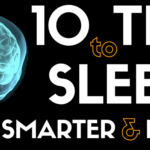This month we are continuing to focus on the 4 small steps that will create big health changes, and for No. 3 this month, we will talk about sleep.
Just like water, we know we need to have it, but we typically don’t get enough. There are soooo many problems with this. Let’s quickly touch on a few and then spend some time diving deeper.
What’s The Problem?!
- Society tends to glamorize those who run on very little sleep. Those people are the “hard-workers,” the “hustlers.” Let’s stop choosing to believe this.
- Lack of sleep creates health issues ranging from mental health, emotional health, and physical health.
- Lack of sleep impacts mood, emotions, relationships and ability to be cognitively present.
- Our bodies heal and repair when we can, not only sleep, but obtain good quality sleep.
- Quality of sleep is also a major issue.

Make Sleep Sexy Again
We’ve seen sleep deprivation in movies (the reporter writing all night, the investigator on the brink of cracking a case).
All the entrepreneurs simultaneously talk about sacrificing sleep while they also tell you how important it is to get enough of it to be successful.
And then….there is the competitive nature and glamorization of the non-sleeper by society. We all want to be seen as someone who is a hard worker, competent and dedicated to _______ (fill in the blank).
Friends, we need to make sleep sexy again. Showing up tired, moody, unhealthy and, in fact, less productive isn’t helping anyone. We don’t look like heroes or hard workers. Instead, we look and act like chronically ill zombies who have become more dangerous to ourselves and those around us.
So, let’s break the trend. Let’s understand and champion for our sleep. I know it feels like there isn’t enough time in a day to get all the things done. You’re right. There will always be something. So, while we trudge through the continual “somethings” that demand our time, let’s show up fresh, healthy and clear headed.
I guarantee you’ll show up in your day stronger, more confident, collected, and efficient than your counterpart who struggled through hours of tasks because they thought putting their health last was the way to go. If you struggle to put your health first, a house call doctor may help. Schedule flexibility and a stronger doctor-patient relationship can help motivate you to keep health in mind as you navigate your day.
Dig deeper into how sleep contributes to our productivity, safety, and health with Dr. Kirk Parsley by listening to his interview on the Wellness Force Podcast here.
Here are some tips that can help;
- Set realistic goals. Look ahead at your entire week. Make a list of tasks that can actually be accomplished during your day and be ok saving some tasks for another day. Prioritize your tasks with deadlines.
- Follow a sleep schedule! I can’t emphasize this enough. Teaching your body when it is time to sleep and wake, and allowing it that consistency, will allow you to thrive!
- No Screens Before Bed! Allow yourself some down time without screens at the end of the day to decompress so that you’re not stewing while you’re trying to get to sleep. It’s not a secret anymore that our phones, computers, and tv’s stimulate our brains. That’s not what we need right before we lay down for sleep. Reading, journaling, taking a warm bath, or breathing exercises and meditation are really helpful.
Sleep & Chronic Health Issues

Hormones
Hormone levels change while we sleep. While sleeping, various hormones either rise or fall to accomplish important processes such as metabolism, repair, stress reduction, immune system strengthening, and even our ability to handle social situations. The foundation of chronic disease is a long-term imbalance of various hormones, causing inflammation, and then, chronic diseases. For example, stress can make it difficult to fall and stay asleep. This affects your cortisol production (which affects your metabolism). Trouble falling and staying asleep will cause cortisol imbalances, which equals stress, and in turn, inflammation.
Heart Disease
The leading cause of death among men and women in the US! One study I read said when we aren’t getting enough sleep, more hypocretin (a hormone that plays a key role in regulating sleep, metabolism, & energy levels) signaling is present. This, along with increased levels of stress hormones (cortisol, epinephrine, norepinephrine) and substances that indicate inflammation, are all key players in the development of heart disease.
Diabetes
Feeding off of the hormone imbalance, it’s fully accepted that lack of sleep is going to impact our bodies metabolic abilities. Chronically being out of glucose homeostasis is a known contributor of T2D. Also, the inappropriate regulation of insulin (the hormone that tells our bodies to store blood sugars) defines the disease.
Dementia
Beta-amyloid is a protein that has been associated with dementia. Among patients struggling with Alzheimer’s, this protein has been identified as accumulating in the brain. When we get good quality sleep, our bodies are able to clear this protein from the brain. There is still a lot of research to be done on the relationship between sleep and dementia, but there is clear evidence that a build-up of beta-amyloid is not good!
The older we get, the more we are impacted negatively by poor sleep habits. There are so many aspects of our health that are impacted by sleep. While I only pointed out a few of the big ones at a basic level, my hope is that you recognize the basic premise of…
- Lack of sleep & poor sleep quality lead to
- Hormone imbalance, which leads to
- chronic inflammation, which leads to
- Chronic disease (disease that has built over time)
To teach our bodies how to thrive with a consistent sleep/wake cycle will change our lives. This is no small statement, but it’s also no small truth. You sacrificing sleep is you sacrificing your health and well-being. It’s as straightforward as that.
Dr. Matt Accurso takes you through what could be impacting your sleep, and therefore other aspects of your health, on the Wellness Force Podcast. Listen to him here.
 Sleep & Mood
Sleep & Mood
Many of us can likely relate to lack of sleep contributing to crankiness, stress, anger, sadness and less ability to maintain emotional agility throughout the day.
But, what we think of less often is how mood can also affect our sleep. Stress and anxiety in particular, can cause irritability and arousal, making it hard for our bodies to relax and get rest.
What I want you to see here is the vicious cycle. This cycle leads to many of the physical health issues we already talked about, but it also leads to psychiatric complications as well. The more stress and anxious we are, the less we sleep we get (or in some cases, people sleep too much in avoidance of difficulty) and the end result is often anxiety and depression.
Anxiety and depression can create environments for people in which they feel like they’re not able to participate in activities that can help, such as clean eating (they eat for convenience or comfort), exercise, prayer, meditation/breathing exercises, etc.
Just focusing on creating and sticking to a consistent sleep schedule, can dramatically help elevate your mood and allow you to be more emotionally agile. If you also take the time to establish a bed time routine that helps your body ease into and prepare for sleep, the quality of your sleep will improve. So consistent and better quality sleep may greatly impact your ability to overcome and avoid mood complications.
Chrono What?!
Let’s uncover your chronotype! You can take this quiz to learn yours.
Are you a night owl or the early bird catching worms?
A person’s chronotype is biological. If you’ve heard of circadian rhythm, you know where I’m going.
Chronotypes exists on a spectrum, and everyone can be different, which is ok! But, as you’ve been working to establish a bed and wake routine, you’ll notice you either feel great or feel “off”. Knowing when your body thrives and has the most focus and energy is important. So, while you’re finding what works best for you, realize you may have to adjust what time you go to bed and what time you wake up to see where you feel the best!
This month’s focus is on sleep, so take the time to really focus on it. Adjust bed time by 30 minutes or so if you’re still not feeling like you’re in a flow with bed and wake times. It’s ok if this takes longer than this week. The point is to understand the importance of our sleep to our health, well-being, and productivity. Finding that sweet spot is well worth the work!
Get Out Of Debt – Sleep Debt That Is!
Sleep debt. Can it really be repaid?
The verdict is still out on this one, but the answer lies somewhere in between yes and no. While many studies have shown that we are able to regain the restorative effects of sleep that we may have missed on a bad night, it typically happens over the course of a few nights, rather than just one where we can sleep in.
Falling into a sleep deficit, however, is a different story. This is where we chronically get less sleep than we should. Continually missing sleep makes it impossible for us to make that sleep up, and therefore, all the devastating impacts to our health happen.
If you miss getting in enough hours of sleep (7-9 is recommended), here are a few ways you can make it up.
- Take a power nap of about 20 minutes in the early afternoon
- Sleep on the weekends, but not more than two hours past the normal time you wake up
- Sleep more for one or two nights
- Go to bed a little earlier the next night
Conclusion

Oh yes, I’m about to jump on that self-care bandwagon!
Oftentimes people think of self-care as a thing done outside of normal routine (mani/pedi, massage, dinner with friends). Those things are great! But self care can also be the way you begin and end your day and I would argue that this form of it is of greater value to your health!
If you take one thing away from this entire thing, let it be this…Establish a sleep routine! Go to bed around the same time every night. Have an easy and calming routine to help you fall asleep that doesn’t include screen time. Wake up around the same time every morning. Finally, have a morning routine that sets you up for a successful day (journaling, quiet cup of coffee, workout, meditation, affirmations are some examples). Prioritizing yourself in this way is actually the least selfish thing you can do because you will show up aware, present, mood balanced, and productive.
So, go get some rest and if you want to look into how AI can help, listen to what Matteo Franceschetti and his team have created here. It’ll blow your mind!
I Can Help!
Hi! As a fitness and nutrition strategist, I work to help people take small steps toward lasting health change. These steps will be positively disruptive to your life and health! And the best part?! They won’t require you to completely shake up and change your day-to-day routine. Together, we will navigate your lifestyle, current health status, environment, and health/fitness goals to create steps to uniquely fit who you are. For a free, initial consultation, email me at amandaaddis86@gmail.com. I look forward to connecting with you!
~ Amanda
Amanda Haile is a Nutrition & Fitness strategist with 8 years experience. She coaches others on building health from the inside out and uses her own experience battling hidden disease to teach people that their environment (mental, physical & emotional) has greater influence on their health than they may understand. Her signature style is to teach people how to take baby steps toward health, so that changes stay exciting, are manageable and sustainable. Feel healthier and more confident so that you’re living a life of health, joy, and happiness that will bleed into your success and relationships. You can follow her on Instagram at @amanda.m.haile
Interested in eating more healthy for life?
Listen to our friends over at Wellness Force Radio to learn about the “5 Must Have Nutrition Fundamentals”


 Sleep & Mood
Sleep & Mood





 The Health Risks of Vaping: What You Need to Know
The Health Risks of Vaping: What You Need to Know